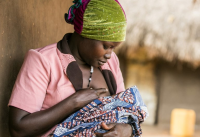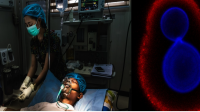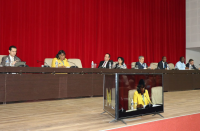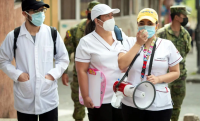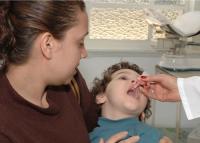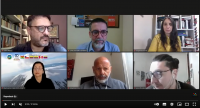You are here
News
-
12/05/2022 - The fourth event of the Workshop Cycle "The training and work of health technicians in the post-Covid world" will be held on December 12 (Monday), from 10 am to 12 pm, and will focus on the role of technicians in the generation and use of health information and records that make up the health information systems of their countries. Mediated by Sebastián Tobar, advisor of the Center for International Relations in Health (Cris) at Fiocruz, and Carlos Eduardo Batistella, coordinator of International Cooperation at the Joaquim Venãncio Polytechnic School of Health (EPSJV/Fiocruz), the workshop will bring together Isabel Duré, Consultant in Policies and Management of Human Resources for Health at PAHO/WHO; Alicia Madalena Ferreira Mais, from the School of Economic Sciences and Administration of the University of the Republic (FCEA/Udelar - Uruguay); and Bianca Borges Leandro, professor, and researcher from EPSJV. Participate, learn more about the topic and contribute to the enrichment of the debate!
-
12/02/2022 - WHO is convening over 300 scientists who will consider the evidence on over 25 virus families and bacteria, as well as “Disease X”, which indicates an unknown pathogen that could cause a serious international epidemic. The process began on Friday and will guide global investment, and research and development (R&D), especially in vaccines, tests, and treatments.
-
11/17/2022 - WHO launched new guidelines to improve survival and health outcomes for babies born early (before 37 weeks of pregnancy) or small (under 2.5kg at birth). The guidelines advise that skin to skin contact with a caregiver – known as kangaroo mother care – should start immediately after birth, without any initial period in an incubator. This marks a significant change from earlier guidance and common clinical practice, reflecting the immense health benefits of ensuring caregivers and their preterm babies can stay close, without being separated, after birth.
-
11/07/2022 - On the eve of the pivotal climate talks at COP27, WHO issues a grim reminder that the climate crisis continues to make people sick and jeopardizes lives and that health must be at the core of these critical negotiations. WHO believes the conference must conclude with progress on the four key goals of mitigation, adaptation, financing and collaboration to tackle the climate crisis.
-
10/31/2022 - The WHO fungal priority pathogens list (FPPL) is the first global effort to systematically prioritize fungal pathogens, considering the unmet research and development (R&D) needs and the perceived public health importance.
-
10/24/2022 - The current challenges facing health systems after the COVID-19 pandemic, as well as how to achieve the Sustainable Development Goals (SDGs) by 2030, were the focus of a high-level panel on the second day of the fourth edition of Cuba Salud 2022, an international health convention occurred in Havana until 21 October. The Director of the Pan American Health Organization (PAHO), Carissa F. Etienne, said that "limited and uneven progress in the implementation of the 2030 Agenda was further set back by the COVID-19 pandemic. The world, including the Region of the Americas, is not on track to meet the Sustainable Development Goals, including SDG 3" on health and wellness.
-
10/18/2022 - A new UN report shows that women’s and children’s health has suffered globally, as the impacts of conflict, the COVID-19 pandemic and climate change converge, with devastating effects on prospects for children, young people and women. Data presented in the report show a critical regression across virtually every major measure of childhood wellbeing, and many key indicators of the Sustainable Development Goals (SDGs).
-
10/06/2022 - Latest edition, realesed ate the 30th Pan American Sanitary Conference, details the impact of the pandemic, highlights a reduction in life expectancy and presents lessons for the future.
-
09/26/2022 - The Pan American Health Organization Director (PAHO) has called on countries to urgently strengthen surveillance and routine vaccination campaigns. “We must not take the lifesaving power of vaccines for granted”.
-
09/16/2022 - With the collaboration of the International Network for the Training of Health Technicians (RETS) and its sub-networks, as well as with the support of the Pan American Health Organization, the Center for International Relations of Fiocruz and VideoSaúde, the Joaquim Venâncio Polytechnic School of Health (EPSJV/Fiocruz) held, on September 13, the workshop "Mental Health and the Training of Health Technicians" as part of the 2nd Cycle of Workshops "The Training and Work of Health Technicians in the Post-Covid-19 World".



